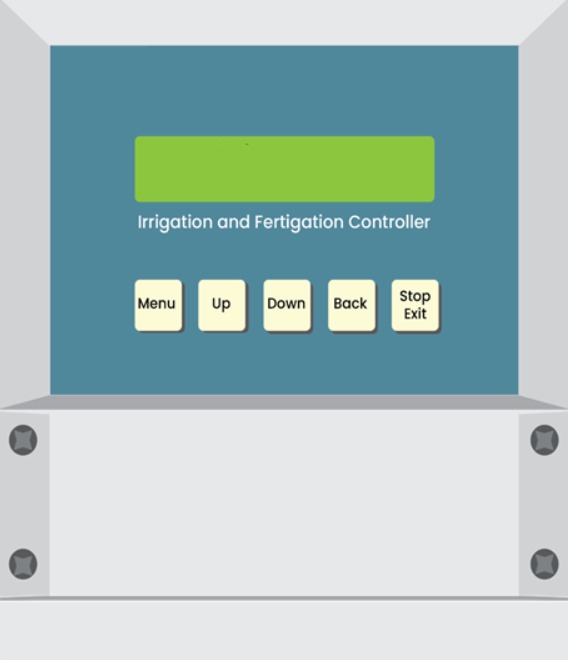Irrigation and Fertigation controller

Features
- Automatic Resumption of Irrigation after Power Outages.
- Health Monitoring for Pump Motors.
- Expandable Capability for up to 12 Valves.
- Well Recharging and No-Flow Detection.
- Control for Fertigation Processes.
- Monitoring and Response to Rain Conditions.
- Surge Protection Mechanism.
- Compatibility with Solar-Operated Pumps.
Applications
Irrigation and fertigation controllers play a crucial role in modern agriculture by providing automated control and precision in managing water and fertilizer application. Here are some key applications of irrigation and fertigation controllers:
Automated Irrigation:
Crop Irrigation Management: Controllers enable automated scheduling of irrigation cycles, ensuring crops receive the optimal amount of water at the right time.
Water Conservation: Precise control helps in preventing over-irrigation, reducing water wastage, and promoting sustainable water use.
Precision Fertigation:
Optimized Nutrient Delivery: Fertigation controllers allow for the precise and automated application of fertilizers along with irrigation water, ensuring that crops receive the right amount of nutrients for optimal growth.
Nutrient Uniformity: Controllers help maintain uniform nutrient distribution across the field, minimizing variations in crop performance.
Variable Rate Irrigation (VRI)
Tailored Irrigation Levels: Advanced controllers can be integrated with VRI systems to adjust irrigation rates based on field variability, optimizing water usage according to soil and crop requirements.
Time and Labor Savings
Reduced Manual Intervention: Automation of irrigation and fertigation processes reduces the need for manual labor, allowing farmers to focus on other critical aspects of crop management.
Scheduled Operations: Controllers allow for the scheduling of irrigation and fertigation activities, saving time and effort in manual monitoring and adjustment.
Environmental Control in Greenhouses:
Climate Management: Controllers are used to regulate irrigation and fertigation in greenhouse environments, maintaining specific humidity and temperature conditions for optimal plant growth.
Nutrient Film Technique (NFT) Systems: Controllers are employed in NFT systems, ensuring a continuous flow of nutrient-rich water to plants in a controlled environment.
Drip Irrigation Systems
Efficient Water Use: Controllers optimize the operation of drip irrigation systems, providing water directly to the plant roots, reducing evaporation and water runoff.
Ideal for Perennial Crops: Drip systems, controlled by these controllers, are well-suited for perennial crops and orchards.
Remote Monitoring and Control:
Mobile Accessibility: Many controllers offer remote monitoring and control capabilities through mobile apps or web interfaces, allowing farmers to manage irrigation and fertigation from anywhere.
Alerts and Notifications: Controllers can send alerts and notifications in case of system malfunctions or when specific conditions are not met, enabling timely intervention.
Water Use Efficiency and Sustainability
Optimized Resource Utilization: Controllers contribute to the efficient use of water and fertilizers, promoting sustainable farming practices and minimizing environmental impact.
Compliance with Regulations: Precise control helps farmers adhere to water usage regulations and environmental guidelines.
